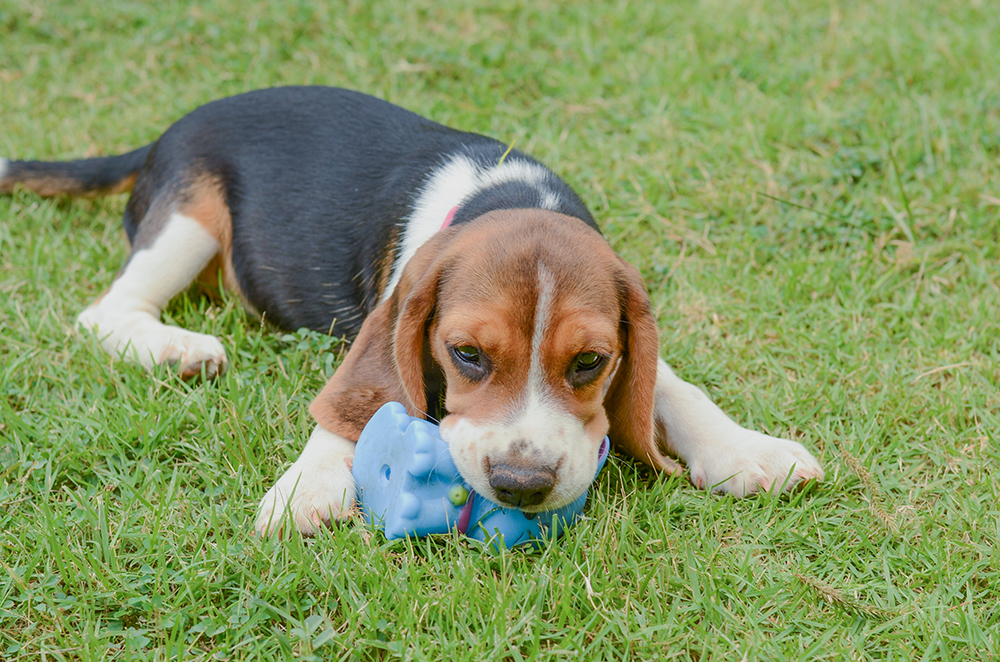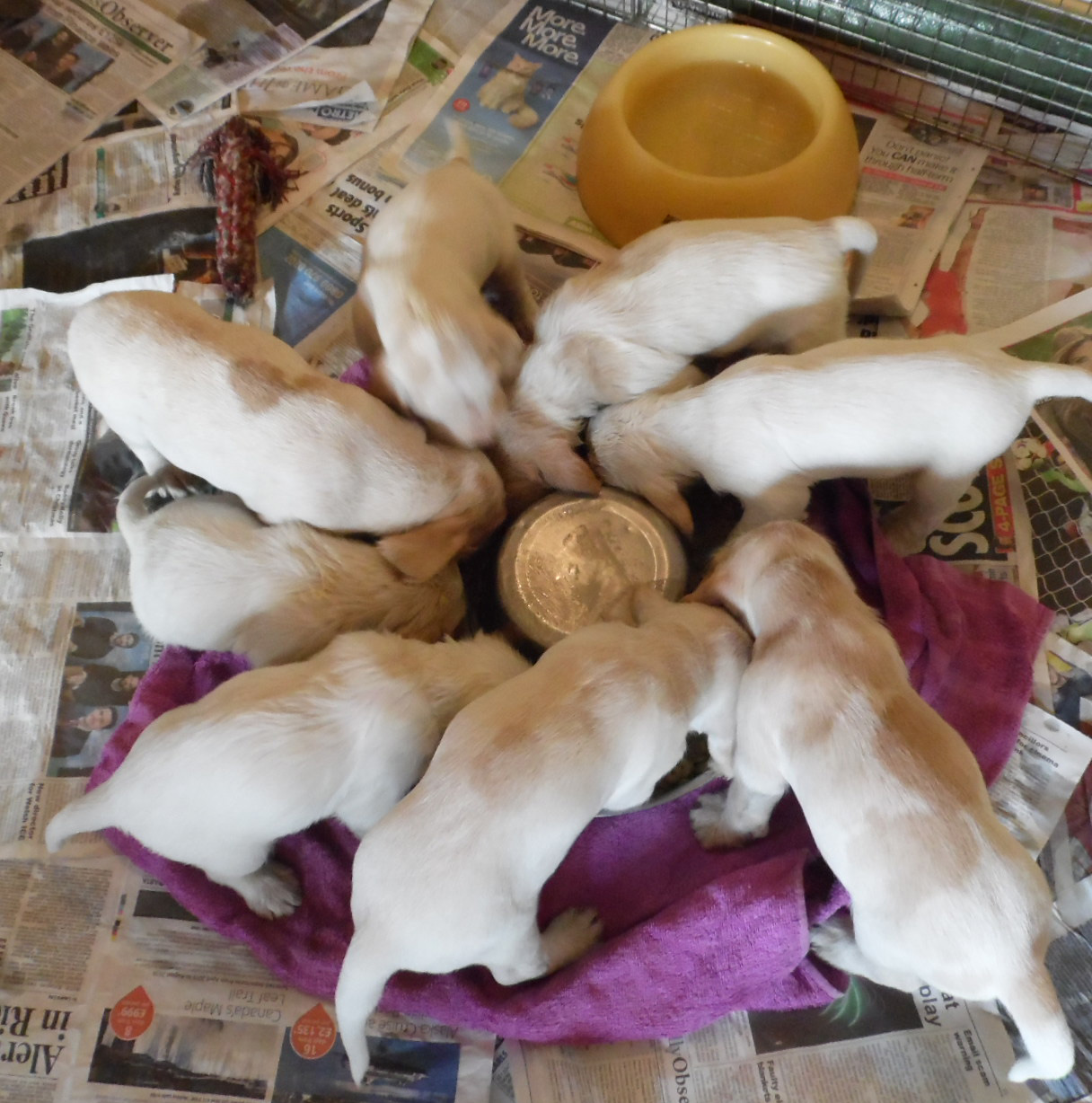Puppy Power! Part One – Early Days
11/04/2015
Giving a puppy the right start in life is a huge responsibility and one that shouldn’t be taken lightly. If done correctly, it can lead to a healthy, well-rounded dog that is a pleasure to own. Putting in place a good diet, making sure they are well socialised and establishing a few early ground rules may seem time-consuming, but putting in the groundwork will make all the difference as the puppy matures into an adult dog. In Part One of our series celebrating all things puppy, to coincide with the launch of Dr John Puppy, we’ll be exploring the important decision to buy a puppy and what happens in those vital first few weeks.
 Choosing a Puppy
Choosing a Puppy
With dog rescue centres overworked and underfunded currently, the decision to buy a puppy should not be taken lightly. In fact there are many benefits to buying an older rescue dog; they are house-trained, may already understand basic commands and have a lot of loyalty and love to give. On the flip side, they can have behavioural problems that will require patience to deal with, though your rescue centre should be able to match up your lifestyle and circumstances with the right rescue dog, and an older dog won’t be around as long.
By investing in a puppy, you’re welcoming a dog into your home for its lifetime. That’s a commitment of 10+ years to your dog’s well-being, health, safety. In return you and your family will gain a loyal friend who will play a significant part in their lives for that length of time. Rescue centre staff maintain that if people took choosing a dog seriously and ensured they chose the right breed for them, then there would be a lot less of a strain on dog charities and rescue centres to start with. So considering carefully which dog breed to go for is a must.
Things to take into account when choosing a dog include:
- How active you are. Do you love getting outside for long walks, no matter what the weather? If so, a highly active dog, such as a spaniel, retriever or sheepdog, would be well suited to your active lifestyle. If not, you would be better off choosing a smaller dog that needs less walking.
- How much of your time you can give. All dogs love company and require mental stimulation as well as physical exercise, but some need more than others.
- Do you have children? A puppy will need to be socialised with children from early on. Some rescue dogs may not have been socialised with children and therefore may not be suitable to have in a family home.
- Do you have other animals? Again, socialisation with other animals from early on is a good idea. Rescue dogs may have issues with other animals.
Once you’ve chosen your breed, it’s time to find a breeder, and a responsible one at that. Here are a few tips to help you find one.
The First Few Weeks
All puppies are born blind and deaf and are totally reliant on their mothers for warmth and food, yet different breeds develop at different rates with some opening their eyes earlier than others or getting their teeth at a different age. For the first two weeks, they will spend a large majority (about 90%) of their time asleep and the rest of their time nursing, taking on board the essential first milk, known as colostrum, from their mothers. Colostrum is packed full of antibodies which will boost the puppy’s immune system and protect them from disease. If you notice signs of poor feeding, like crying and not gaining weight, call your vet as the puppies may need a check-up and some supplementary milk replacement for a time.
Most puppies will double or triple their birth weight in the first week and will continue to grow quickly over the next few weeks. They will even begin to make crawling motions with their legs, which helps to develop tiny muscles and, along with their instinctive senses of smell and touch, allows them to find their mother.
Around the two to four week mark a puppy will start to open it’s eyes and ears and will be able to hear and see fully by five weeks. Along with an increase in mobility at week three, when the puppy learns to sit, stand and walk, and the beginnings of vocalisation, this is the point at which a puppy will start to become more independent from its mother.
This is also the natural point at which socialisation starts. At the outset it may seem difficult to socialise when vaccinations are ongoing, but puppies can be introduced to a variety of sounds and situations in the home. All manner of visitors, from babies and children to adults of all shapes, sizes and personalities, can be invited to visit the house to be introduced to the puppies. Early journeys to the vets, being carried round the town centre, indeed anywhere that allows the puppies to experience new sights, sounds and smells, are all good, as long as the unvaccinated puppy is not walking about where other dogs have been. For more information on socialising, check out David Appleby’s articles on the APBC website.
Around week five baby teeth are coming in and weaning from the mother starts. Choosing a nutritionally-balanced dog food catered specifically for a puppy’s growing and developing body and mind, such as Dr John Puppy, will give them the best start in life. Puppy food tends to be higher in protein and dietary fats as well as including other essentials like fish oils and prebiotics. Puppy food will need to be moistened down to a soft, wet mush and placed in a shallow dish. A little can be smeared on a puppy’s lips to give them a taste, but it is important to encourage them to learn to feed for themselves. With large litters, or if the mother’s milk shows signs of drying up, the puppy diet can be introduced a bit earlier at 3-4 weeks of age to supplement the milk.
At this point, if you’re buying a puppy, you will probably have had a few visits to get to know your puppy and for them to get to know you. You’ll be starting to think about taking them home around the eight week mark and will be preparing your home for their arrival. We’ll start from this momentous occasion in Part Two of our Puppy Power series.
Sources for this article: Gilbertson & Page’s Head of Nutrition, Samantha Ware. The APBC. The Kennel Club. Totally Gundogs.



